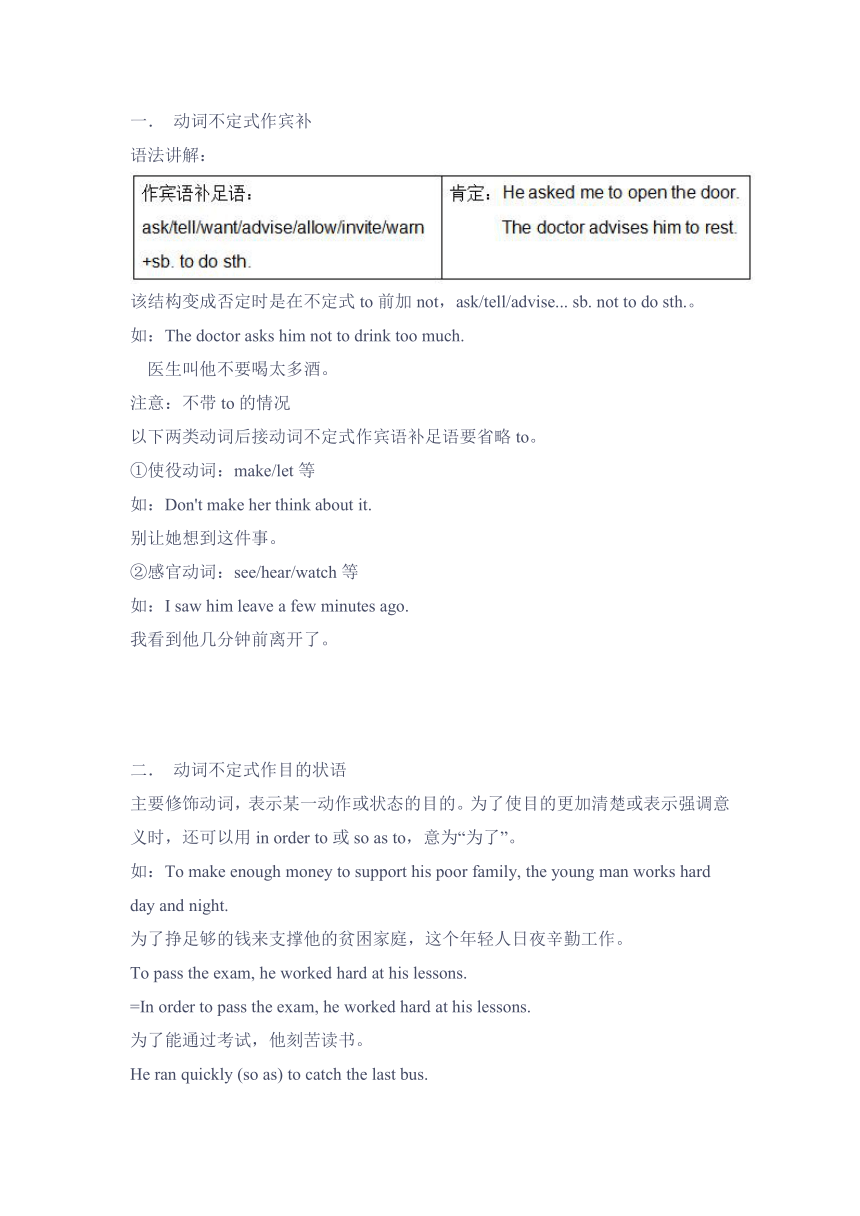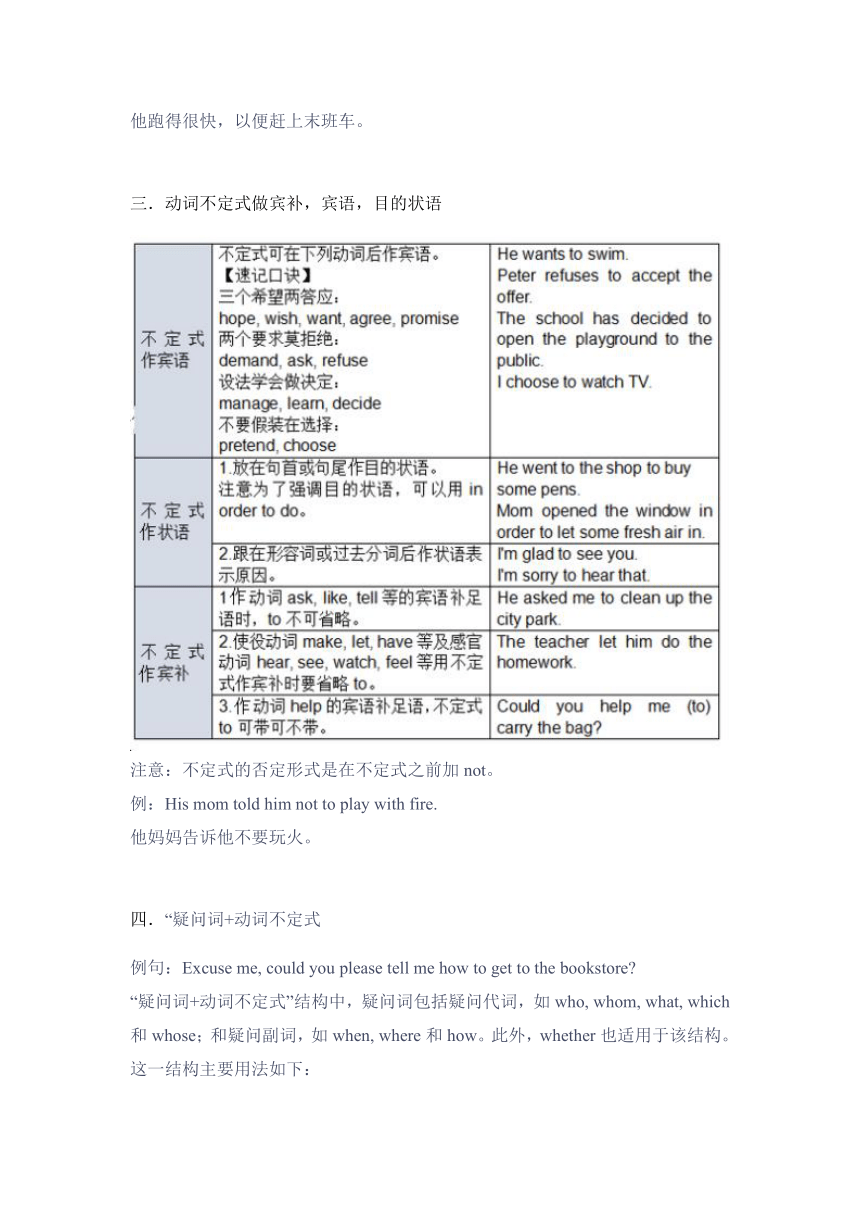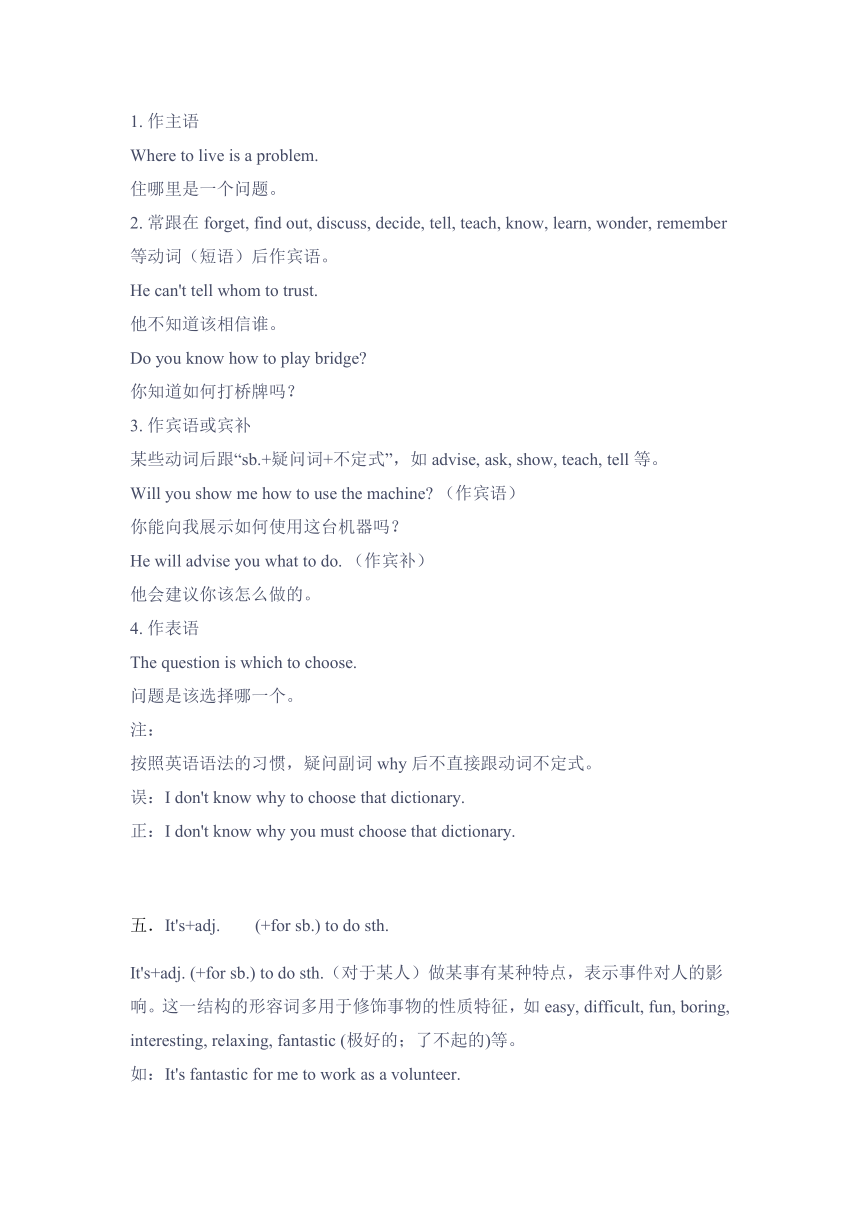人教新目标版英语九年级全Unit 10 You're supposed to shake hands.语法讲解(动词不定式和宾语从句和条件状语从句)
文档属性
| 名称 | 人教新目标版英语九年级全Unit 10 You're supposed to shake hands.语法讲解(动词不定式和宾语从句和条件状语从句) |  | |
| 格式 | docx | ||
| 文件大小 | 219.2KB | ||
| 资源类型 | 教案 | ||
| 版本资源 | 人教新目标(Go for it)版 | ||
| 科目 | 英语 | ||
| 更新时间 | 2020-12-30 10:03:20 | ||
图片预览



文档简介
1257300010337800动词不定式作宾补
语法讲解:
该结构变成否定时是在不定式to前加not,ask/tell/advise... sb. not to do sth.。
如:The doctor asks him not to drink too much.
? ?医生叫他不要喝太多酒。
注意:不带to的情况
以下两类动词后接动词不定式作宾语补足语要省略to。
①使役动词:make/let等
如:Don't make her think about it.
别让她想到这件事。
②感官动词:see/hear/watch等
如:I saw him leave a few minutes ago.
我看到他几分钟前离开了。
动词不定式作目的状语
主要修饰动词,表示某一动作或状态的目的。为了使目的更加清楚或表示强调意义时,还可以用in order to或so as to,意为“为了”。
如:To make enough money to support his poor family, the young man works hard day and night.
为了挣足够的钱来支撑他的贫困家庭,这个年轻人日夜辛勤工作。
To pass the exam, he worked hard at his lessons.?
=In order to pass the exam, he worked hard at his lessons.
为了能通过考试,他刻苦读书。
He ran quickly (so as) to catch the last bus.
他跑得很快,以便赶上末班车。
三.动词不定式做宾补,宾语,目的状语
注意:不定式的否定形式是在不定式之前加not。
例:His mom told him?not to play with?fire.
他妈妈告诉他不要玩火。
四.“疑问词+动词不定式
例句:Excuse me, could you please tell me how to get to the bookstore?
“疑问词+动词不定式”结构中,疑问词包括疑问代词,如who, whom, what, which和whose;和疑问副词,如when, where和how。此外,whether也适用于该结构。这一结构主要用法如下:
1.?作主语
Where to live is a problem.
住哪里是一个问题。
2.?常跟在forget, find out, discuss, decide, tell, teach, know, learn, wonder, remember等动词(短语)后作宾语。
He can't tell whom to trust.
他不知道该相信谁。
Do you know how to play bridge?
你知道如何打桥牌吗?
3.?作宾语或宾补
某些动词后跟“sb.+疑问词+不定式”,如advise, ask, show, teach, tell等。
Will you show me how to use the machine??(作宾语)
你能向我展示如何使用这台机器吗?
He will advise you what to do.?(作宾补)
他会建议你该怎么做的。
4.?作表语
The question is which to choose.
问题是该选择哪一个。
注:
按照英语语法的习惯,疑问副词why?后不直接跟动词不定式。
误:I don't know why to choose that dictionary.
正:I don't know why you must choose that dictionary.
五.It's+adj.?(+for sb.) to do sth.
It's+adj.?(+for sb.) to do sth.(对于某人)做某事有某种特点,表示事件对人的影响。这一结构的形容词多用于修饰事物的性质特征,如easy, difficult, fun, boring, interesting, relaxing,?fantastic?(极好的;了不起的)等。
如:It's fantastic for me to work as a volunteer.
对我而言,当一名志愿者可真棒。
若形容词修饰的是不定式前行为者的性格、品质,则用句型It is+adj.?(+of sb.) to do sth.?这一结构的形容词多用于修饰人的品质特点,如kind, good, nice, clever等。
如:It's very kind of you to help me.
你能帮我,人可真好。
It's clever of you to work out the maths problem.
你真聪明,解出了这道数学题。
六.If引导的宾语从句和条件状语从句
if引导的宾语从句:
1.?语序:宾语从句要用陈述语序,即“主+谓”的语序。
例:I don't know if he will come tomorrow.
我不知道明天他是否会来。
2.?连词if:宾语从句中,当从句的成分完整、意思缺少“是否”之意时,连词可用if。
例:She is quite not sure if she should quit her job.
她相当不确定她是否应该辞去她的工作。
注意:
1.if引导的从句不能直接与or not连用。
2.当宾语从句提到句首时,不能用if,只能用whether引导。
3.if不能引导带to的不定式,也不能放于介词后作宾语。
if引导的条件状语从句:
1.?if意为“如果”,引导条件状语从句时,既可放在主句前面,也可放在主句后面。若if条件句放在句首,从句后面常加逗号与主句隔开。
If you go there, I'll go, too.
如果你去那儿,我也会去。
2.?时态运用:
在含有if引导的条件状语从句的主从复合句中,主句为下列情形之一的,条件状语从句通常用一般现在时。
(1)?主句是一般将来时,即遵循“主将从现”的原则。
If he comes, he will bring his violin.
如果他来,他就会把他的小提琴带来。
(2)?主句是含有情态动词may/might/can/must/should等的句子。
If you want to lose weight, you must eat less bread.
如果你想减肥,你必须少吃面包。
(3)?主句是祈使句。
If you are not strong enough, please don't take part in such an activity.
如果你不是很健壮,请不要参加这种活动。
3.?句型转换:
(1)?借助“祈使句+and/or+陈述句(一般将来时)”这一句型来转换。其中,在句意上and表示顺承;or表示转折,意为“否则”。
If you work hard, you'll pass the exam easily.
=Work hard, and you'll pass the exam easily.
努力学习,你将很容易通过考试。
=Work hard, or you won't pass the exam easily.
努力学习,否则你不会轻易地通过考试。
(2)?借助without或with来与条件状语从句进行互换。
If there is no water, fish will die.
=Fish will die without water.
如果没有水,鱼将会死。
If you help me, I'll finish the work soon.
=With your help, I'll finish the work soon.
如果你帮助我,我将很快完成工作。
?
由连词if引导的宾语从句和条件状语从句辨析:
1.if的条件句中没有将来时态,宾语从句可以有。
2.if引导宾语从句通常放在动词、形容词后面,不可置于句首;不能引导介词后面的宾语;从句不能直接和or not连用。
3.if引导条件状语从句时翻译成“如果”,引导宾语从句时翻译成“是否”。
语法讲解:
该结构变成否定时是在不定式to前加not,ask/tell/advise... sb. not to do sth.。
如:The doctor asks him not to drink too much.
? ?医生叫他不要喝太多酒。
注意:不带to的情况
以下两类动词后接动词不定式作宾语补足语要省略to。
①使役动词:make/let等
如:Don't make her think about it.
别让她想到这件事。
②感官动词:see/hear/watch等
如:I saw him leave a few minutes ago.
我看到他几分钟前离开了。
动词不定式作目的状语
主要修饰动词,表示某一动作或状态的目的。为了使目的更加清楚或表示强调意义时,还可以用in order to或so as to,意为“为了”。
如:To make enough money to support his poor family, the young man works hard day and night.
为了挣足够的钱来支撑他的贫困家庭,这个年轻人日夜辛勤工作。
To pass the exam, he worked hard at his lessons.?
=In order to pass the exam, he worked hard at his lessons.
为了能通过考试,他刻苦读书。
He ran quickly (so as) to catch the last bus.
他跑得很快,以便赶上末班车。
三.动词不定式做宾补,宾语,目的状语
注意:不定式的否定形式是在不定式之前加not。
例:His mom told him?not to play with?fire.
他妈妈告诉他不要玩火。
四.“疑问词+动词不定式
例句:Excuse me, could you please tell me how to get to the bookstore?
“疑问词+动词不定式”结构中,疑问词包括疑问代词,如who, whom, what, which和whose;和疑问副词,如when, where和how。此外,whether也适用于该结构。这一结构主要用法如下:
1.?作主语
Where to live is a problem.
住哪里是一个问题。
2.?常跟在forget, find out, discuss, decide, tell, teach, know, learn, wonder, remember等动词(短语)后作宾语。
He can't tell whom to trust.
他不知道该相信谁。
Do you know how to play bridge?
你知道如何打桥牌吗?
3.?作宾语或宾补
某些动词后跟“sb.+疑问词+不定式”,如advise, ask, show, teach, tell等。
Will you show me how to use the machine??(作宾语)
你能向我展示如何使用这台机器吗?
He will advise you what to do.?(作宾补)
他会建议你该怎么做的。
4.?作表语
The question is which to choose.
问题是该选择哪一个。
注:
按照英语语法的习惯,疑问副词why?后不直接跟动词不定式。
误:I don't know why to choose that dictionary.
正:I don't know why you must choose that dictionary.
五.It's+adj.?(+for sb.) to do sth.
It's+adj.?(+for sb.) to do sth.(对于某人)做某事有某种特点,表示事件对人的影响。这一结构的形容词多用于修饰事物的性质特征,如easy, difficult, fun, boring, interesting, relaxing,?fantastic?(极好的;了不起的)等。
如:It's fantastic for me to work as a volunteer.
对我而言,当一名志愿者可真棒。
若形容词修饰的是不定式前行为者的性格、品质,则用句型It is+adj.?(+of sb.) to do sth.?这一结构的形容词多用于修饰人的品质特点,如kind, good, nice, clever等。
如:It's very kind of you to help me.
你能帮我,人可真好。
It's clever of you to work out the maths problem.
你真聪明,解出了这道数学题。
六.If引导的宾语从句和条件状语从句
if引导的宾语从句:
1.?语序:宾语从句要用陈述语序,即“主+谓”的语序。
例:I don't know if he will come tomorrow.
我不知道明天他是否会来。
2.?连词if:宾语从句中,当从句的成分完整、意思缺少“是否”之意时,连词可用if。
例:She is quite not sure if she should quit her job.
她相当不确定她是否应该辞去她的工作。
注意:
1.if引导的从句不能直接与or not连用。
2.当宾语从句提到句首时,不能用if,只能用whether引导。
3.if不能引导带to的不定式,也不能放于介词后作宾语。
if引导的条件状语从句:
1.?if意为“如果”,引导条件状语从句时,既可放在主句前面,也可放在主句后面。若if条件句放在句首,从句后面常加逗号与主句隔开。
If you go there, I'll go, too.
如果你去那儿,我也会去。
2.?时态运用:
在含有if引导的条件状语从句的主从复合句中,主句为下列情形之一的,条件状语从句通常用一般现在时。
(1)?主句是一般将来时,即遵循“主将从现”的原则。
If he comes, he will bring his violin.
如果他来,他就会把他的小提琴带来。
(2)?主句是含有情态动词may/might/can/must/should等的句子。
If you want to lose weight, you must eat less bread.
如果你想减肥,你必须少吃面包。
(3)?主句是祈使句。
If you are not strong enough, please don't take part in such an activity.
如果你不是很健壮,请不要参加这种活动。
3.?句型转换:
(1)?借助“祈使句+and/or+陈述句(一般将来时)”这一句型来转换。其中,在句意上and表示顺承;or表示转折,意为“否则”。
If you work hard, you'll pass the exam easily.
=Work hard, and you'll pass the exam easily.
努力学习,你将很容易通过考试。
=Work hard, or you won't pass the exam easily.
努力学习,否则你不会轻易地通过考试。
(2)?借助without或with来与条件状语从句进行互换。
If there is no water, fish will die.
=Fish will die without water.
如果没有水,鱼将会死。
If you help me, I'll finish the work soon.
=With your help, I'll finish the work soon.
如果你帮助我,我将很快完成工作。
?
由连词if引导的宾语从句和条件状语从句辨析:
1.if的条件句中没有将来时态,宾语从句可以有。
2.if引导宾语从句通常放在动词、形容词后面,不可置于句首;不能引导介词后面的宾语;从句不能直接和or not连用。
3.if引导条件状语从句时翻译成“如果”,引导宾语从句时翻译成“是否”。
同课章节目录
- Unit 1 How can we become good learners.
- Section A
- Section B
- Unit 2 I think that mooncakes are delicious!
- Section A
- Section B
- Unit 3 Could you please tell me where the restroom
- Section A
- Section B
- Unit 4 I used to be afraid of the dark.
- Section A
- Section B
- Unit 5 What are the shirts made of?
- Section A
- Section B
- Review of Units 1-5
- Unit 6 When was it invented?
- Section A
- Section B
- Unit 7 Teenagers should be allowed to choose their
- Section A
- Section B
- Unit 8 It must belong to Carla.
- Section A
- Section B
- Unit 9 I like music that I can dance to.
- Section A
- Section B
- Unit 10 You're supposed to shake hands.
- Section A
- Section B
- Review of Units 6-10
- Unit 11 Sad movies make me cry.
- Section A
- Section B
- Unit 12 Life is full of the unexpected
- Section A
- Section B
- Unit 13 We're trying to save the earth!
- Section A
- Section B
- Unit 14 I remember meeting all of you in Grade 7.
- Section A
- Section B
- Review of Units 11-14
